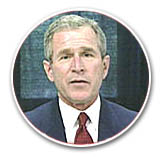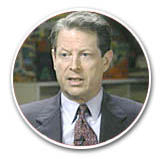 |
|
NewsHour Links: Convention Voices: Check here for updates written by young people at the conventions. Top Story: Republicans and Democrats gear up for their national political conventions Jim Lehrer interviews Republican candidate George W. Bush Jim
Lehrer interviews Democratic candidate RealAudio: It's
Education: Gore
and Bush
on education RealAudio:
Gore and Bush
address the NAACP Outside Links: The Republican Convention Web site Don't pass up
your opportunity to have your say. If you're eighteen, make sure you're
registered to vote.
|
What's
the Deal? Capital punishment, a budget
surplus, the Supreme Court. A tax cut, saving social security, offering
universal health care. Compassionate conservatism, progress and prosperity,
campaign finance. In the words of the great philosopher of our time,
"What's the deal?" Even Jerry Seinfield knows
what all these catch words are associated with - this fall's presidential
election. The Republican and Democratic
Conventions this summer in Los Angeles and Philadelphia, respectively,
will be the forums for the nation's two major parties to convene and
agree about their candidates for the White House. And for many Americans, little serious attention has been paid to the election that has yet to catch their interests. Household Names By now, Al Gore and George
Bush are household names, but that doesn't mean they are table conversation. I am very excited for the opportunity to let my voice be heard, to stake my claim as a United States citizen. The 26th's a Big Deal if You're 18 Eighteen year olds gained
the right to vote in 1971 as a result of the ratification of the twenty-sixth
amendment. Prior to that, only four states had permitted citizens younger
than twenty-one to vote: Georgia, Kentucky (18), Alaska (19) and Hawaii
(20). In 1972, the
first Presidential election was held in which all eighteen year old
Americans could cast ballots. Ever since, the youth vote
has struggled to become a prominent voice in the American political
landscape. Only
32.4 percent of eligible voters between 18 and 24 went to the polls
in November 1996, compared to 49.6 percent in 1972. Why Don't We Care? What's the deal with voter
apathy? The youngest group of eligible
voters tends to offer less than impressive reasons for not voting. According to a study conducted
by the Census Bureau, one in four of those between 18 and 24 who did
not vote in 1996 didn't make it to the polls because they were too busy
or didn't get any time off. Reasons
to Care In my humble opinion, it
is this group of unconcerned voters that has the most riding on this
election. An examination of the campaign's most talked about issues
suggests long-term implications that will leave our generation of leaders
responding to the actions of a President Bush or a President Gore. Here's the case for youth involvement in the political process: Environment: The Kyoto
Agreement in 1997 regarding global warming made great progress in the
global environmental effort. However, U.S. leadership could be decisive
in arranging similar international conferences and making strides now
to protecting the only earth we have for future generations before the
effects become uncorrectable. So Here's the Deal So that's the deal with getting involved in this fall's election. And it's key to remember that while the race for the Oval Office is gaining most of the press, your local Congressional district is up for grabs and possibly one of your U.S. Senate seats, not to mention a slew of state and local races. So if the spirit moves you,
read the newspaper, get acquainted with the candidates who want to represent
you, get yourself involved with a campaign, but above all, if you are
eighteen, register to vote and then do so in November. If you are a student and will not be home for the election, look into arranging to receive an absentee ballot. Go to your city hall and make sure you don't miss out on your chance to vote even if you aren't at home in November. I'll see you at the polls!
|





